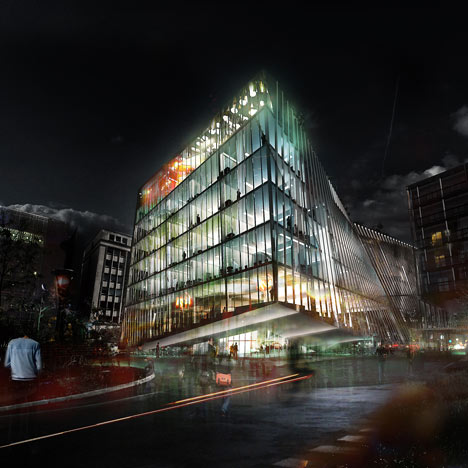Danish architects BIG and Paris studio OFF have won a competition to design a research centre for Sorbonne Université Pierre et Marie Curie in Paris.
The tilted glass facade reflects the famous Notre Dame Cathedral and surrounding Parisian skyline down into the surrounding square.
The centre will combine research and business with transparent walls between laboratories and offices, which will be visible from a public staircase leading to the rooftop terrace.
Light will filter to all floors through a central atrium containing informal meeting places.
BIG and OFF won the competition in collaboration with engineers Buro Happold, consultants Michel Forgue and environmental engineer Franck Boutte.
See all our stories about BIG here, more about Paris here and more about mirrors here.
Here are some more details from BIG:
BIG + OFF WIN THE COMPETITION TO DESIGN THE RESEARCH CENTRE OF THE UNIVERSITY OF JUSSIEU IN PARIS
BIG + Paris-based architects OFF, engineers Buro Happold, consultants Michel Forgue and environmental engineer Franck Boutte is the winning team to design the new 15.000 m2 research centre for Sorbonne’s Scientific university Université Pierre et Marie Curie in Paris.
The new multidisciplinary research centre, Paris PARC, located between Jean Nouvel’s Institut du Monde Arabe and the open green park of the Jussieu Campus will become a significant addition to the campus, strengthening the international appeal and openness of the leading French University for Science and Medicine.
The facility will bring together academic scholars and the business community, while re-connecting the university physically and visually with the city of Paris. The winning team was honored as the best design among proposals from MVRDV, Lipsky Rollet, Mario Cucinella and Peripherique.
Paris PARC is located in the visual axis of the Notre Dame Cathedral in a dense context of university buildings from different historical periods. BIG proposes a building geometry that adapts to the specific conditions of all adjoining sides, optimized for daylight, views and accessibility.
The three-dimensional envelope retracts from the neighboring facades, opens up towards the square of Institut du Monde Arabe and the park, and folds into a publicly accessible rooftop landscape, resulting in an adapted sculptural building volume situated between the emblematic architectural monuments of the university.
“As a form of urban experiment the Paris PARC is the imprint of the pressures of its urban context. Wedged into a super dense context – in terms of space, public flows and architectural history – the PARC is conceived as a chain of reactions to the various external and internal forces acting upon it. Inflated to allow daylight and air to enter into the heart of the facility, compressed to ensure daylight and views for the neighboring classrooms and dormitories, lifted and decompressed to allow the public to enter from both plaza and park and finally tilted to reflect the spectacular view of the Paris skyline and the Notre Dame to the Parisians.” Bjarke Ingels, Founder, BIG.
A central canyon provides daylight and a visual connection between laboratories and offices. In the atrium a cascade of informal meeting spaces lead to the public rooftop terrace and faculty club.
A public stair to the rooftop offers glimpses into the activities of the laboratories which are divided by transparent walls throughout the building to ensure visual connections between the working spaces.
The upper levels have panoramic views towards the Notre Dame and the skyline of Paris.
“We propose a building that creates the optimum conditions for encounters and exchange among the academics and visitors of Paris PARC.
Like a scientific incubator the new building will provide the physical environment for nurturing growth of cultures and sharing of ideas - through the internal mix of laboratories, research facilities and informal meeting spaces, and through a reunification with the public life of the city.” Andreas Klok Pedersen, Partner-in-Charge, BIG.
The Paris PARC becomes the interface between campus life and city life by reuniting the Jussieu Campus with the city of Paris.
The iconic view of the Notre Dame Cathedral is brought into the daily life of the building through the large panoramic windows while the façade towards the entrance square is slightly tilted, hence, a mirrored image of the Cathedral becomes visible at eyelevel on the square, connecting the building to its iconic location.
PROJECT: Paris PARC
STATUS: 1. Prize
Partners-in-Charge: Bjarke Ingels, Andreas Klok Pedersen
Project Leader: Daniel Sundlin
Architect: Gabrielle Nadeau
Team: Camille Crepin, Edouard Boisse, Tiina Liisa Juuti, Alexandre Carpentier
Partners-in-Charge: Manal Rachdi, Tanguy Vermet, Ute Rinnebach
Project Leader: Daniel Colin, Antonio Rovira
Team: Akram Rachdi, Olfa Kamoon

